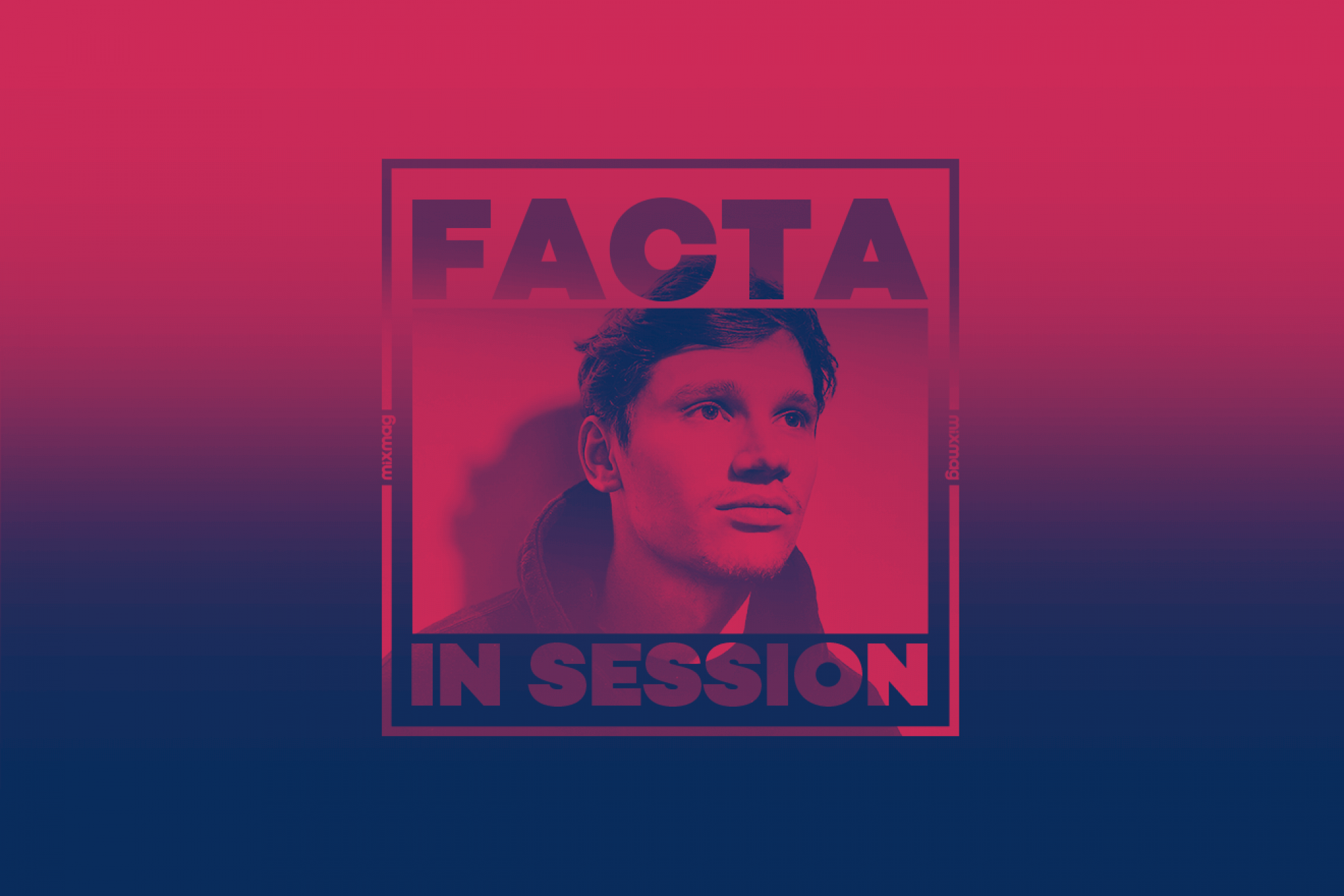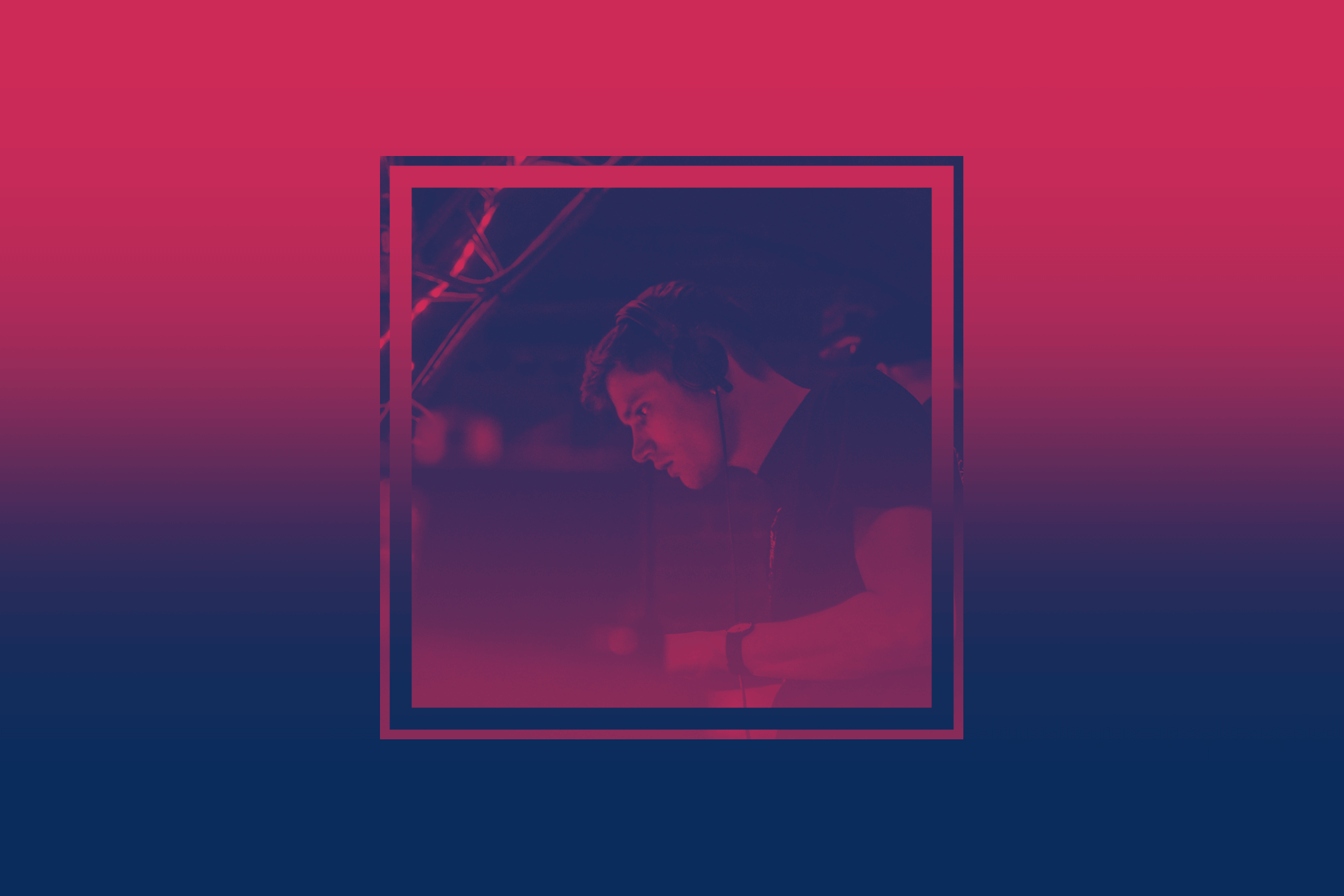 Music
Music
In Session: Facta
Dive inside the always on-point tastes of Wisdom Teeth co-founder Facta in this hour-long mix
Over the past six years, Facta and K-LONE have grown their Wisdom Teeth label into one of the UK’s foremost outlets for inventive takes on electronic music. They’ve never stayed married to one style, working across a wide spectrum of sounds to regularly pursue fresh interests. The resulting output is buy-on-sight worthy: a trove of disruptive club rhythms, shapeshifting experiments, sublime ambient, blissed-out house and more, all tied together and presented coherently by the dependable ears and solid working relationship of two childhood friends.
Facta relates his varied interests to his upbringing in East London. “Growing up in London means you’re surrounded by a really diverse set of music scenes, which is obviously very inspiring. Being a teenager in London while dubstep, grime and UK funky were popping off was massive,” he says. He began attempting to produce bassline and grime by the age of 14, before becoming a disciple of the dubstep movement and labels/nights such as Tempa, Hyperdub, DMZ and FWD>>. “I used to lock into Rinse FM and sit on dubstepforum threads fishing for IDs and refreshing the page constantly to read everyone’s match analyses,” he recalls.
In 2014 we featured him in our Guide production mix series, by which point the then-21-year-old had relocated to Bristol. His sound at the time reflected dubstep’s descent into a slower take on bass-loaded UK soundsystem music that had taken root in the city, as Facta found himself at home among the inspiring group of artists circling the orbit of labels such as Livity Sound, Tectonic, Idle Hands, Young Echo and Hotline Recordings. That same year he co-founded Wisdom Teeth with K-LONE and began releasing music by peers such as Hodge, Acre and Alex Coulton.
The label’s fifth release in 2017 - a V/A EP featuring Simo Cell, Don’t DJ and K-LONE titled ‘On Line, Vol. 1’ - marked something of a turning point towards a broader palette of sounds not strictly wedded to the dancefloor. Since then the label has grown from strength to strength by following the tastes of the founders in whichever direction they take. Further releases have included a transcendent EP from LOFT (now known as AYA) that was dipped into by Björk for her 2017 Cover Mix, gorgeously deep sounds from Duckett, and K-LONE’s knockout debut album ‘Cape Cira’, a record fuelled by dreams of escapism to an imagined paradise that couldn’t have sounded any more welcome in the bleak lockdown depths of 2020. Next up Facta is taking our minds back to the dancefloor and a hopeful return in the not too distant future with the 12” hit of musical ecstasy, ‘Doves / MPH’.
As a DJ Facta is similarly broad in his scope, playing the sounds he enjoys at any given moment, whether that’s palpitating club instrumentals, UKG or vocal-led pop and rap bangers. To hear and read about what he's feeling at the moment, check out his In Session mix and Q&A below.

Picture the scene: it’s mid-2020, a deadly virus has cancelled clubbing worldwide, you’re logging into a virtual venue and Dixon is playing your ‘Tip Me Baby One More Time’ remix to the partying pixels. If someone had described this scenario to you at the start of the year, would you have found the global pandemic or Dixon spinning Facta deep cuts the more surreal aspect?
Well, as surprising as it was to see the big man pick up that track, I would still have to say the pandemic pips it! What a total shit show.
What have you made of the events industry’s attempts to adapt to the pandemic, and what hopes and concerns do you have for its future?
Everyone’s just made the most of an extremely dire situation. There have been some good live streams and e-festivals and things for sure, but I’m sure everyone’s agreed it’s no substitute for the real thing. Some of the distanced events have looked surprisingly vibey, although I’ve not really made it down to many of them. I have so much respect for everyone who has worked so hard to adapt and keep things going, particularly when the situation changes week on week. I guess realistically our best bet is the vaccine, right? I’m positive about the future though - I don’t believe we’re going to be stuck in this cycle for years and years to come, and I think our scene is resilient and will bounce back. But it’s not going to be easy in the meantime.
Read this next: Partying through the pandemic
Your new EP ‘Doves / MPH’ makes me feel like I’m on a dancefloor and my brain is melting, which is very much appreciated, this year especially. What inspired the release?
Thank you! I just wanted to write something that was fun and a little bit cheesy but that had an interesting sound palette. Both tracks were written pretty quickly.
What draws you to broken beats and irregular rhythms in music?
Well to be honest at the moment I’m going through a big 4x4 phase, which growing up I never thought I’d say! How tastes change. But growing up I was definitely always more into broken beats - that music is often less restrained and a bit more upfront and gully, which is what first grips a lot of people coming into dance music I think.
Why did you start Wisdom Teeth and how has your approach to the label progressed over the last six years?
We’d always talked about starting a label and just naively assumed we’d be really good at it from the off, so gave it a crack. It turns out it’s a bit harder than we thought, so I’d say it took us a good few years to really work out what we wanted to do with it and how to make everything function as it should. Now we’re at a point where we basically know what we’re doing and things run smoothly, which is a relief! A big growing point has been paying proper attention to what we’re doing for our artists - making sure we’re doing everything we can to help get the record out there and to help grow their audience, create new opportunities and maybe generate a bit of income in the process. When we started, we only released on vinyl and were basically of the opinion that you can’t make money from selling records so why try. But in hindsight that was lazy and a bit naive. There’s not loads of money in releasing music at our level and ultimately it has to be for the love of it, but there’s plenty of work a label can do to help do the best by its artists. And at the moment they need all the help they can get, so thinking a bit more about that side of things has been an important learning curve to tackle.
The way Djrum was scratching and blending with Lurka’s ‘Stay Let’s Together’ got you hyped last year. What are you looking for in the music you release on Wisdom Teeth and its impact on DJs and dancefloors?
Yeah that clip was great wasn’t it? Big ups Djrum! Those explosive moments that really stick in your memory are the best, often when a big vocal track is involved. I guess we like the idea that any of our tracks might help provide moments like that, or lead DJs in interesting directions, but I guess everyone wants that! It’s also really nice to see tracks end up in interesting places and to see them reaching a wider audience.
How do you and K-LONE share working on the label – is everything a joint decision or does one of you take the lead on certain things? How do you think your tastes and approach complement each other?
Yeah everything is a joint decision. Luckily we’re pretty much in sync on most things, and I feel like we help balance out each other’s blind spots well. I’d say I’m probably a bit more cautious and prone to overthinking things a bit, whereas Joe is refreshingly unfussy. He’s really good at just saying let’s go for something when I might um and ah for months on end.

Wisdom Teeth has had a busy year. How have you found working in music through this time? And how important have Bandcamp days been for you as an independent artist and label owner?
It’s been a really weird year on that front as the global situation has basically coincided with our biggest year. The K-LONE album blew up much bigger than we thought it would, and in part that was a result of the context we found ourselves in. It’s such a gentle and uplifting record that I think it really made sense against the backdrop of lockdown. It’s been sad to see it do so well but then not see how that might have translated to the live setting and other opportunities, but we’re just super grateful it’s been well received. Likewise, the Shielding and Parris records are both quite gentle records, so we didn’t have a problem of having lots of club records lined up with no clubs to play them in.
Initiatives like Bandcamp day and a general swell of people buying more music has been a lifesaver, and have also presented quite an uplifting alternative vision of a music industry that isn’t so totally beholden to the gig lifestyle, touring, and writing music for clubs. But also at times it has felt totally redundant, bordering on offensive, to even think about release schedules and promo when everything is so chaotic and difficult for so many people.
In light of the pandemic crippling gigging and highlighting how financially reliant on it many DJs have been, do you have any thoughts or ideas on how the economics of dance music should change to more evenly distribute income and make the industry more viable for artists?
I think the industry was a broken business model before the pandemic, and this year there’s been some much needed self-analysis on all sides. Ultimately I think we need to focus on developing revenue streams for artists that aren’t so totally events-based, and ideally these would be run by artists and communities themselves. Mat Dryhurst has some interesting thoughts on this. Essentially if people were willing to pay a little bit more for music, and the platforms were better at distributing this to the creators (more Bandcamp, less Spotify), we could get to a point where artists can make a modest living from releasing music without having to tour constantly, which is damaging for the environment, for creativity, and for clubbing itself.
Read this next: Should a fee-sharing model between DJs and producers be enforced in dance music?
Has the pandemic impacted your tastes or your appetite for digging through club music at all? What sounds have you been particularly interested in this year?
I think I was already feeling slightly less interested in full-pelt club music prior to the pandemic. It’s not particularly deep - these things tend to come and go in phases, and I was just going through a patch of being more into other things. But still certain records grip me and then I go through a period of only wanting to listen to belters for a bit. Clubby stuff that’s really caught my ear this year: the slow UK funky stuff coming from Supa D’s label, Housupa; DJ Plead and all of Livity Sound’s output; both of Laksa’s amazing records; Two Shell.
I understand you’ve become a big fan of BBC Radio 3’s Night Tracks in lockdown. What do you like about those shows?
Big up Radio 3, honestly. During the day it’s obviously very traditional and staid, and I still really can’t get down with how much opera they play. But in the evenings they play loads of really experimental music beyond classical and into jazz, electronic, field recordings and so on. It gives NTS a proper run for its money at points. Night Tracks is on at 11pm every Monday, Tuesday and Wednesday and it’s sick. I’ve discovered so much mad music through it, and it’s put together in an incredibly meticulous way. It’s just a joy to listen to.
You’ve spoken on how the music that your sound is rooted in was created by Black artists and the obligation to respect its Black roots. What can white people who are involved in this music do to be better allies?
Growing up listening to dubstep, it felt like the scene was genuinely pretty diverse. Not perfect by any stretch - there was a massive gender imbalance for example, which never got properly criticised at the time - but there were lots of very prominent Black artists right at the very top of the scene, and it felt like proper respect was paid to the people who created the sound and where it came from. I’d say this was the last time I can remember that being the case in dance music. Since then - and particularly in more mainstream and profitable scenes like house and techno - it is clear that, as you look up the ranks, fewer and fewer Black artists get access to the same opportunities, the same bookings, the same fees. It’s a huge tragedy that so many Black artists today talk about feeling totally alienated in a world that they were instrumental in creating. In short, we need to educate ourselves on where the music came from; buy, sign and book Black artists; make sure Black artists are given the same recognition and opportunities that are so readily afforded to white artists. Everyone needs to make an effort to make this happen because that’s the only way progress will be made. And it really works. What’s happening at the moment mirrors corresponding work to address the gender imbalance in dance music over the last few years, and the change there has been massive. The problem hasn’t been solved by any stretch, but the way that dance music has changed from a total boys club into a much more diverse and open scene through concerted effort to make that happen has been amazing. We need to keep moving in that direction.
Read this next: The roadmap to change
You also make music under the name Reverend Slippy. Can you tell me about that project?
Ah, it’s just a silly name I have used a few time to put out UKG tunes. I picked it as a joke to put out a tune on the first Dr Banana release a few years back - if I’d known I’d still be using it years down the line I might have picked something less dumb…
How did you approach putting together your In Session mix?
I wanted to put something together that reflects what I want from dance music at the moment. For whatever reason I’m not massively interested in listening to an hour of all-out club gear at the moment. At the moment I like when things overlap a bit with pop music - vocal tracks, rap and so on. With clubs closed I’m most likely to be listening to tunes while cooking dinner or in the car, so I like stuff that my girlfriend will also want to listen to rather than stuff that really sounds best at 3am in a dark basement. Again, that’s a current preference that reflects the current times. I’m sure it’ll all swing the other way as circumstances change. But for now, I’m after that sweet spot where it’s quite poppy and hooky but also has an experimental lean and something interesting to it. There’s some new music from mates inside, plus some bangers I’ve been listening to recently.
Tracklist:
?? - ?? (unreleased)
Two Shell - 'Bio Bitch' (unreleased)
Simisea - 'Catorra' (SLINK)
Florentino - 'Missin U' (Self-released)
Isabella Lovestory - 'Galosa' (Self-released)
E-Unity - 'Inner Osc' (TEMET)
K-LONE - ?? (unreleased)
Lurka - 'Wrapped Up' (Hotline)
Za Talent - 'Telex' (Animals Dancing)
Call Super & Parris ft Fox - 'Design Of A Body Sublime' (forthcoming)
Swordman Kitala & K-Lone - 'Malanga Ja' (Blip Discs)
Apple - 'Picky Head' (Housupa)
Cyrana - 'Bruin' (Accidental)
Marco Bernadi - 'Catman's Going To Get You' (brokntoys)
Addison Groove - 'Allaby' (50 Weapons)
Facta - 'MPH' (forthcoming Wisdom Teeth)
Karma - 'Drizzle' (EL-B Remix) (forthcoming GD4YA)
386i - 'ORKL-0114-01 B' (Die Orakel)
Hodge - 'Sense Inversion' (Facta + K-LONE Remix) (forthcoming Houndstooth)
Para - 'Let You Go' (Self-released)
'Doves / MPH' is out on November 27 via Wisdom Teeth, pre-order it on Bandcamp
Patrick Hinton is Mixmag's Digital Features Editor, follow him on Twitter
Read this next: Get the best of Mixmag direct to your Facebook DMs


